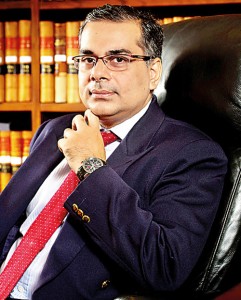Sri Lankan pump and dump offenders must be brought to book – Jafferjee
Sri Lankan investors who pump and dump on shares should be prosecuted with the same level of seriousness of other crimes such as burglary and theft, according to the CEO of a top broking firm.

Murtaza Jafferjee
Murtaza Jafferjee, CEO JB Stockbrokers told the Business Times that pumping and dumping exists (contrary to some irrational beliefs in the past) and that totally illegal.
“There’re two types of pump and dump – one is pump and dump on unsuspecting retailers; other is doing so on shares of fiduciary institutions such as the Employees Provident Fund (EPF) in connivance with officers within,” he said, highlighting that both these happened in the past at the Colombo Stock Market.
Probes of market manipulation and insider trading against 17 investors, brokers and institutions, including high-profile businessmen were nearing completion in August 2012 when some powerful investors complained to President Mahinda Rajapaksa regarding the then Securities and Exchange Commission (SEC) Chairman Thilak Karunaratne saying he was enforcing rules that were too rigid and not market-friendly. Mr. Karunaratne who resigned during this time after a losing battle to strengthen the regulatory process, has returned to the SEC with many saying that the investigations against past malpractices will be restarted.
Mr. Jafferjee noted that market manipulation including pump and dump are ‘not’ victimless’ crimes. “Pump and dump shouldn’t be confused with speculation. Speculators are those who bet on shares by predicting what prices they should be at in the future,” he reiterated. He added that volatility in a capital market is an undeniable factor where speculators will take directional bets on volatility. He said that in the past market abuse was 15 to 20 per cent of regulation, which was the most controlled and highlighted. “This is where the public has been harmed the most. There’s full trace and transactions are an electronic exchange. The exact identity can be traced.”
Mr. Jafferjee added that there’re manipulators in a share market, because the wrongdoers are exploiting inefficiency.
“If a market is liquid they can’t do it,” he said, adding that the first challenge in this backdrop is to increase the financial assets and introduce things such as short – selling which will drive transaction costs lower.
He also noted that shares are an under – owned asset class. “The challenge is to increase equity as an asset class.” According to Mr. Jafferjee it’s easier to regulate through competition than through regulatory enforcement. “The regulator has to ensure there’s sufficient competition.”
Further on regulation Mr. Jafferjee added that there should be a sufficient deterrent to counter malpractices and an element of seriousness.
He added that contrary to popular market belief, the capital market should have a fewer number of listed firms and a large number of investors followed, well run firms which will give a better breadth and depth to the market.


